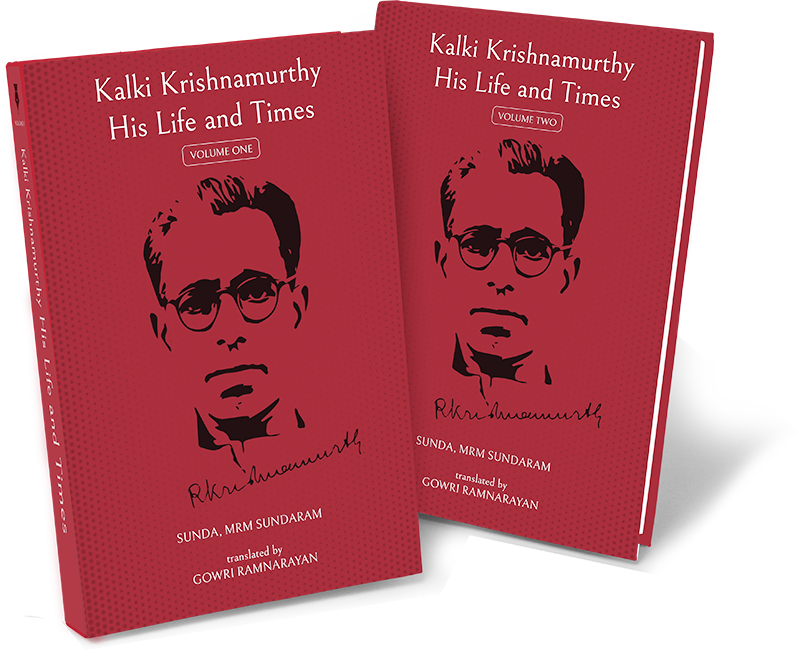
Kalki Krishnamurthy
his life and times
Gowri Ramnarayan
A translation of the biography in Tamil
PONNIYIN PUDALVAR
By ‘Sunda’ MRM Sundaram
Note on the Title:
Ponniyin Pudalvar, (the son of Ponni), is a reminder that Kalki was born in the region nurtured by the river Ponni, another name for the Kaveri, where the Imperial Chola monarch Rajaraja I was known as Ponniyin Selvan (Ponni’s beloved son), the name of Kalki’s spectacular cult novel.
A few words about how this translation project was conceived:
Pandemic has now become a household word. The youngest children and the oldest adults in nearly every family casually use it in conversation. Just a few months ago it was an unfamiliar word associated mainly with science fiction. Few of us who are alive today had lived through an earlier pandemic. As it has engulfed the planet, the coronavirus has revealed aspects of the many frailties and weaknesses in our social fabric. Yet, it has also strengthened our resilience, our imagination, and our bonds with one another.
Those who are familiar with historic episodes of the plague and the black death may recall the works of Boccaccio and Chaucer. Their stories, set with groups of people gathering in isolation to escape infection, are suddenly reminiscent of our times. The internet and platforms like WhatsApp and Zoom have made myriad forms of sharing and communication possible.
Truth be told, my sisters Gowri, Rukmini, and I have had more together time in the past year than we had in the previous decade. The two sisters had together started reading the biography of our grandfather, Kalki Krishnamurthy. When I heard about their reading sessions, I too eagerly joined in. Four times a week we would get together and Gowri would read aloud chapter each day to the two of us. Coffee and conversation flowed too as the characters in the story kindled our memories and we would each recall some incident or the other. Gowri was the only one to have known our grandfather for he died young. He was just fifty-four and little Gowri was only four years old when he died. We each had our own memories of the many conversations with our grandmother and our mother. Gowri, being the eldest, had the most experiences and her recollections about more people who appeared in the pages of Sunda’s work were vivid.
Sunda, we all agreed, had done an exceptional job of writing the biography. We were surprised as well at the depth of his research and his method. The story of Kalki had been painted on the canvas of the burgeoning Independence movement and sharply invoked the passions and predilections of the times. It was a story of the birth of a nation and an awakening of a people as much as it was the tale of a single man. Kalki had been a small, frail, even physically diminutive figure who wielded a powerful pen with an instinct for getting at the core of every issue about which he wrote. Each of us felt strongly that there was much current-day relevance in better understanding his life as well as the times in which his writings were keenly anticipated and widely read. There was a time when his Kalki magazine in Tamil had the largest circulation of any weekly magazine in all of India – in any language!
The pity was that this powerful story was out of the reach of those who are not able to read it in Tamil. When Rukku shared various incidents from the chapters with our friend Ruby, she was fascinated by the story and asked her why this wonderful book was not translated. Rukku then brought it up in conversation with us and the idea immediately captured our imagination. Would Gowri do the translating? Could we get permission from the copyright holder? How could we share this story with all of India and with new generations of readers? Before we knew it, we had obtained permission and some initial funding. The rest we trusted to the power of the tale.
The book will be released in late February 2022. Watch for regular events we are planning during the year to introduce the book and to celebrate Kalki Krishnamurthy, his life, and his times.
We hope you will order and read this book and that it will find its way into the hands of many readers who are unable to read Sunda’s definitive biography in Tamil.
Shankar Ramachandran
March 2021

